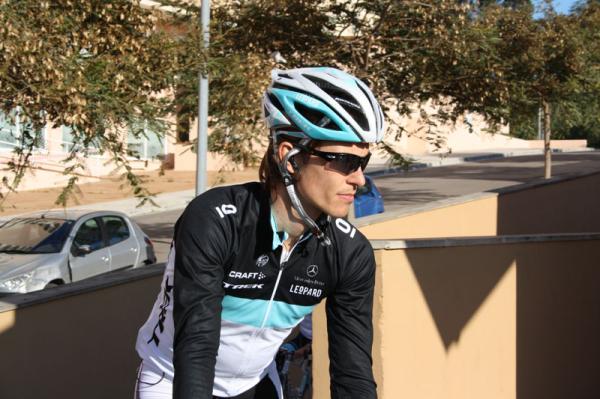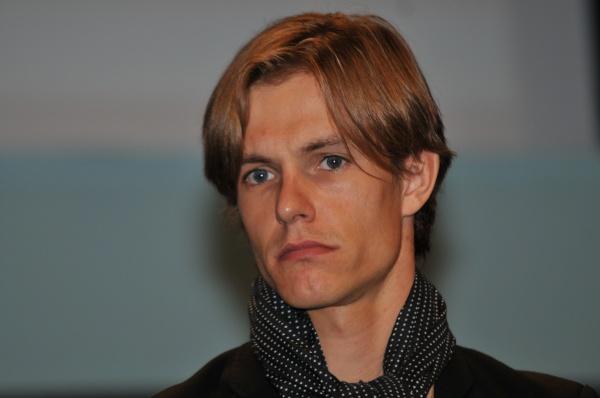Gerdemann says UCI Biological Passport is enough to combat doping
German Leopard talks Tour, Cecchini and trust


Linus Gerdemann (Leopard Trek) has defended his team’s decision not to introduce internal drug testing, reiterating the squad’s belief that the UCI’s Biological Passport is a reliably stringent anti-doping tool. The German also believes that he can he can help the Schleck brothers to Tour de France glory in July, while also having his own opportunities.
Speaking at the team’s training camp in Mallorca, Spain, Gerdemann says he has fitted right into his new surroundings after two years at the defunct Milram squad.
“The training is perfect. I really like what we’re doing and that the weather is beautiful. I’ve been here in other years when it’s been tough with snow in January. Now it’s much warmer and a lot easier to work in,” he told Cyclingnews.
“It doesn’t feel like a new team because I know most the guys already and I’ve known them for a long time so it feels more like a bunch of friends coming together again. It’s fun nearly every day and nice to work with them.”
Gerdemann was a team leader for two seasons at Milram but his new surroundings mean he will play a more supporting role, although his talent and experience will allow him to have his own chances in week-long stage races – where he is hoping to spring a few surprises.
“I’m focussed on stage races and for sure the main goal for the team is the Tour de France and I hope we can all do a great job there.
“In the Tour they’re [the Schlecks] our main goal and maybe there’s a nice stage there for me, but the main focus is for me to support them.
The latest race content, interviews, features, reviews and expert buying guides, direct to your inbox!
“There are a couple of interesting races for myself but I don’t want to say what races I want to focus on just yet, but mainly week-long stage races.”
Internal testing
Shortly after the team’s presentation in Luxembourg last week it was announced that the squad would rely on the UCI’s Biological Passport to conduct testing and screening of riders, with no internal testing procedures being carried out.
Gerdemann believes that this should not be seen as a slight on the team’s philosophy or stance on doping, reiterating the management’s assertions that the Passport is sophisticated enough to monitor riders and detect doping.
“I think the Biological Passport is quite tough. We have many controls and no other sport has something like that. It’s a good thing and it think it’s best if someone from the outside is testing us anyway. If you have someone from inside, I don’t know, then there are questions about it just being internal testing. There are many controls and I’m happy that we have the passport,” he told Cyclingnews.
Gerdemann also makes the point that the quantity of anti-doping tests are irrelevant if the testing isn’t at a world class level.
“I don’t know how many I had last year and it would be wrong to make up a number, but we have controls in racing and in training, it’s not everyday but it’s often. All the journalists ask me how many controls I have, but I think it’s not just about how often but it’s about doing it in a smart way. Maybe with the passport they don’t have to do it every day or week. The difference is between quality and quantity of testing. The level of testing in cycling is at the highest level.”
When Gerdemann burst onto the world scene at the Tour in 2007 he was regarded by many as the poster boy of clean cycling in a race that descended into farce after a series of doping stories. He day in yellow and strong anti-doping stance marked him out as a rider of not just physical strength but moral levels too.
His image took a knock, however when it was revealed that he worked with controversial coach, Luigi Cecchini.
However the German talks openly about the relationship, admitting that the collaboration took place but that training files and above-board techniques were the only things shared.
“I worked with him for a couple of months but then stopped and trained myself. He gave me tough training, a lot of intervals and training behind the scooter but we didn’t work for that long together. I learnt a lot though. I think nearly every team is using that information now, with SRM and training files.
“First when I started to work with him it was like ‘wow you’re working with a big coach’ and the media was positive but then there was the Fuentes scandal and then they turned it around and asked why I was working with someone who has so many big riders who were involved in it.”
“In the end I didn’t want to have a bad image created over something that didn’t exist. I didn’t want it to ruin my reputation.”
Reputation appears to be key for Gerdemann and it he believes that a mix of results and the fans’ perception of an athlete are the key ingredients for success.
“I think it’s a combination. You need a good reputation because it’s important to show the fans and supporters that you’re clean and that they can support you and put their trust in you.”
Gerdemann believes that the current climate in cycling has lead to too many negative stories – especially in the German press, where he believes that sporting achievements by riders like Heinrich Haussler (ed., now Australian) and Andre Greipel, have been overshadowed.
“We’ve had a couple of bad surprises but I think in general it’s a fantastic sport and not one sport where you can trust the athletes more because we have the most controls but we have to continue with that.”
“I think it’s important for cycling to have a good image and I think most of the riders are clean but we have to prove and show that cycling is clean. It’s important for cycling that we try and win back trust so people love to watch the Tour.”
Daniel Benson was the Editor in Chief at Cyclingnews.com between 2008 and 2022. Based in the UK, he joined the Cyclingnews team in 2008 as the site's first UK-based Managing Editor. In that time, he reported on over a dozen editions of the Tour de France, several World Championships, the Tour Down Under, Spring Classics, and the London 2012 Olympic Games. With the help of the excellent editorial team, he ran the coverage on Cyclingnews and has interviewed leading figures in the sport including UCI Presidents and Tour de France winners.
